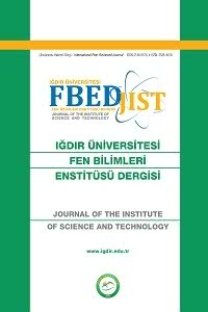Türkiye’nin İnsani Gelişme Endeksinin Analitik Olarak Değerlendirilmesi
İnsani Gelişme Endeksi, Eğitim-Sağlık-Gelir Endeksleri, Türkiye
Econometric Evaluation of Turkey’s Human Development Index
Human Development Index, Education-Health-Income Indexes, Turkey,
___
- Anonim, 2012. http://www.dpt.gov.tr/PortalDesign/PortalControls/ WebIcerikGosterim.aspx?Enc=83D5A6FF03C7B4FC5A7 3E5CFAD2D9676 Erişim: 11.07.2012
- Anonim, 2012. eyi.emu.edu.tr/Conference_CD/info/full%20artic- les/PT107.docx. Erişim: 19.07.2012.
- Dickey D.A., Fuller, W.A., 1979. Distribution of the Estimators for Autoregressive Time Series with a Unit Root, Journal of the American Statistical Assocation, s. 427-431.
- Demir, S. 2006. Birleşmiş Milletler Kalkınma Programı İnsani Gelişme Endeksi ve Türkiye Açısından Değerlendirme. DPT Sosyal Sektörler ve Koordinasyon Genel Müdürlüğü Ankara.
- Şeker, S.,2011. Türkiye’nin İnsani Gelişme Endeksi ve Endeks Sı- ralamasının Analizi, Sosyal Sektörler ve Koordinasyon Genel Müdürlüğü, Ankara.
- Durbin, J., Watson, G.S., 1951. Testing for Serial Correlation in Le- ast Square, Regression, Biometrika, 38. Günsoy, G., 2005. İnsani Gelişme Kavramı ve Sağlıklı Yasam Hak- kı. ZKÜ Sosyal Bilimler Dergisi, Cilt 1, Sayı 2, Zonguldak.
- Gujarati, D.N. 1999.Temel Ekonometri, (Çev. Ü. Şenesen ve G.G. Şenesen), Literatür Yayınları, İstanbul.
- Karabulut, T., Kaya, N., Gürsoy, Z., 2009. Ekonomik Kalkınma ve İşbirliği Örgütü’ne Üye Ülkelerin 2006 Yılı İnsani Gelişmişlik Düzeylerinin Analizi. Niğde Üniversitesi İİBF Dergisi, 2(2):1- 18.
- Karasoy, D., 2008. Hacettepe Üniversitesi Aktüerya Bilimleri Bölü- mü 4. sınıf Korelasyon-Regresyon Dersi Notları. Kutlar, A., 2007. Ekonometriye Giriş. Nobel Yayınları, Ankara.
- Legendre, A.M. 1805, Nouvellesméthodeşpour la déterminationdes orbitesdescomètes. “Sur la Méthodedesmoindresquarrés”.
- Yeşim, M., 2001, “Küresel Yoksulluk ve Birleşmiş Milletler” Top- lum ve Bilim Dergisi, 89: 75-87 Yaz, İstanbul. Sevüktekin, M., Nargeleçekenler, M., 2010. Ekonometrik Zaman Serileri Analizi. Nobel Yayınları. Ankara.
- ISSN: 2146-0574
- Yayın Aralığı: 4
- Başlangıç: 2011
- Yayıncı: -
Merve ÖZKAYA, Alper Cihan KONYALIOĞLU, Solmaz Damla GEDİK
Hakkari’de Yetiştirilen Karakaş Koyunlarında Bazı Döl Verimi Özellikleri
Akdeniz Bölgesindeki Makiliklerde Bulunan Çalı Türlerin Gelişme Seyirleri
Yüksel COŞKUN, Alaettin KAYA
Mustafa SÜRMEN, Tamer YAVUZ, Sebahattin ALBAYRAK
Üzüm Tanesinin Histokimyasal Yapısı
Birhan KUNTER, Sevil CANTÜRK, Nurhan KESKİN
Gökkuşağı Alabalığı, Avrupa Deniz Levreği ve Çipura İçin Alternatif Bitkisel Yağ Kaynakları
Cihan PALOLUOĞLU, Hanefi BAYRAKTAR
Tülay ÇİMRİN, Rahşan İVGİN TUNCA
Yüksek Gerilim Şalt Sahası Topraklama Ağının Elektriksel Bazda Projelendirilmesi
